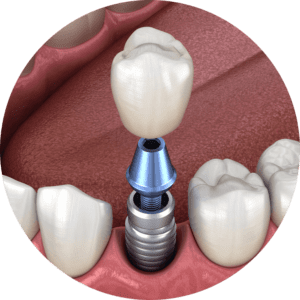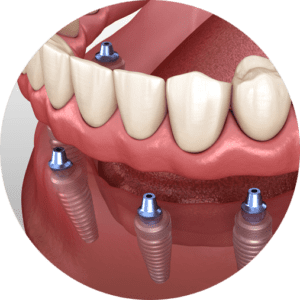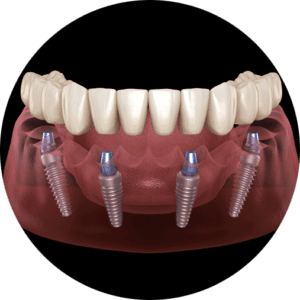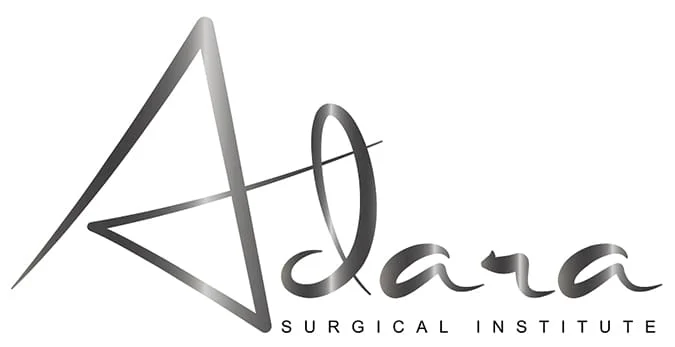Missing teeth can make everyday activities like eating and speaking more challenging and may affect how you feel about your smile and overall appearance.
Over time, tooth loss can lead to bone loss in the jaw, changes in facial appearance, and other oral health issues. Dental implants offer a reliable solution that restores function, improves aesthetics, and supports long-term oral health.
Dental implants provide a lasting solution for missing teeth, improving confidence, function, and overall quality of life.
What Are Dental Implants?




Dental implants are small posts made from durable titanium alloys that act as artificial tooth roots.
They can replace one tooth, a row of teeth, or a complete arch of missing teeth using either single implants and crowns or a combination of dental implants and a custom, natural-looking bridge of teeth.
During dental implant surgery, the posts are placed into the jawbone. Over time, they fuse with the bone through a process called osseointegration, creating a stable foundation for prosthetic teeth. This integration ensures that implants look, feel, and function like natural teeth.
Comparing Tooth Replacement Options
Most patients are familiar with traditional tooth replacement options like dental bridges and conventional dentures. These solutions can restore appearance and some function but have drawbacks.
Dental Bridges
Dental bridges require the removal of some tooth structure from neighboring teeth to support the bridge, which can weaken those teeth over time. Bridges do not stimulate the jawbone, allowing bone loss to occur in the area of the missing tooth.
Conventional Dentures
Conventional dentures rest on the gums without anchoring to the bone. They can slip while eating or speaking, cause gum irritation, limit food choices, and lead to progressive bone loss. This bone loss can affect comfort, function, and facial appearance.
Dental Implants
Dental implants are anchored directly into the jawbone, providing a stable and secure fit. They stimulate the bone, preventing deterioration and preserving facial structure. Implants restore over 98 percent of natural biting and chewing power, allowing you to eat a full range of foods and speak with confidence.
Benefits of Dental Implants
Dental implants offer more than just a way to replace missing teeth. They restore function, improve appearance, and support long-term oral health.
Here are just a few of the benefits:
- Prevent bone loss and maintain facial structure
- Restore chewing power so you can enjoy a varied, healthy diet
- Eliminate slipping or discomfort that can occur with removable dentures
- Preserve adjacent teeth without requiring alteration, unlike dental bridges
- Promote long-term oral health with proper care and regular dental hygiene
- Provide a durable solution designed to last for decades
Types of Dental Implants
Choosing the right dental implant depends on several factors, including bone health, the location of the missing tooth, and your overall treatment goals.
There are three primary types of implants, each designed for specific situations.
Endosteal Implants
These are the most common type of dental implant. They are placed directly into the jawbone and serve as a sturdy foundation for artificial teeth. Endosteal implants are ideal for patients with sufficient bone density and are typically used to support single crowns, bridges, or full-arch restorations.
Subperiosteal Implants
These implants rest on top of the jawbone but under the gum tissue. They are used for patients who do not have enough healthy bone and are unable to undergo bone grafting. A metal framework holds the implant in place, providing support for replacement teeth.
Zygomatic Implants
Unlike traditional implants, zygomatic implants anchor into the cheekbone instead of the jawbone. They are used in cases of severe upper jaw bone loss when traditional implants are not an option. This type of implant provides an alternative to extensive bone grafting procedures.
The table below summarizes the key features of each implant type:
| Type of Implant | Description | Best For |
|---|---|---|
| Endosteal Implant | Titanium posts placed directly into healthy bone | Patients with sufficient bone volume |
| Subperiosteal Implant | Positioned under the gum but above the jawbone; used when bone loss is present | Patients unable to undergo bone grafting |
| Zygomatic Implant | Longer implants anchored in the cheekbone for severe bone loss in the upper jaw | Patients with significant upper jaw bone loss |
Parts of a Dental Implant
A dental implant is made up of three main components, each playing a crucial role in restoring the function and appearance of a natural tooth:
- Implant Post: A small screw-like post, usually made of titanium, placed into the jawbone to act as an artificial tooth root. It provides stability and supports the replacement tooth.
- Abutment: A connector placed on top of the implant post. It attaches the implant to the final restoration and helps shape the gum tissue for a natural appearance. Custom healing abutments may be used to guide the gum tissue during recovery for better aesthetic results.
- Restoration: The visible part of the dental implant, such as a crown, bridge, or denture. It is custom-made to match the shape, size, and color of your natural teeth, restoring full function and appearance.
The Dental Implant Procedure
The dental implant process at Adara Surgical Institute is straightforward and tailored to your needs. Each step is designed to ensure comfort, precision, and long-term success.
Step 1: Consultation and Planning
Your first visit includes a comprehensive exam and a discussion about your dental and medical history. We use advanced imaging, like cone beam CT scans (CBCT), to assess the health of your jawbone. Based on your needs and goals, we create a personalized treatment plan. If you are a candidate for dental implants, we will schedule your surgery.
Step 2: Implant Placement
During the procedure, we prioritize your comfort by offering sedation options, including IV sedation and general anesthesia. If needed, tooth extractions or bone grafting can be completed at the same appointment.
Using a custom surgical guide, the implant is placed precisely into the jawbone. We use high-quality implants from trusted manufacturers to ensure long-term reliability.
In many cases, we also place a custom healing abutment after surgery. This specialized abutment shapes the gum tissue during the healing process, creating a more natural-looking contour around the final restoration and improving the overall outcome.
In some cases, a temporary tooth or bridge can be placed immediately so you leave with a functional smile.
Step 3: Healing and Osseointegration
Healing after dental implant placement happens in two stages. The first stage is the initial recovery from surgery, which usually takes one to two weeks. During this time, the gum tissue around the implant site heals, and any swelling or mild discomfort typically subsides.
The second stage is osseointegration, where the implant fuses with the jawbone. This process can take three months or more. Osseointegration is essential for creating a strong, stable foundation that allows the implant to function like a natural tooth root and ensures the long-term success of your dental implant.
Step 4: Final Restoration
Once the implant has fully integrated, we replace the healing abutment with a permanent abutment that connects the implant to the final restoration. Your custom dental crown, bridge, or full-arch prosthesis will match the color and shape of your natural teeth, restoring both function and appearance.
Recovery and Considerations
Recovery after dental implant surgery is typically straightforward. Most patients experience mild swelling and discomfort that subsides within a few days. You will be given post-operative instructions to follow, including guidance on pain management, oral hygiene, diet, and activity restrictions to support proper healing and implant success.
Why Choose Adara Surgical Institute for Your Dental Implants?
Dental implants are a significant investment in your health and smile, so choosing the right surgeon matters.
At Adara Surgical Institute, you will be cared for by two highly qualified oral and maxillofacial surgeons.
- Dr. Hardeep Dhaliwal is quadruple board-certified and brings extensive experience in both oral surgery and facial aesthetics. His precise approach and commitment to patient care ensure each procedure is performed with skill and attention to detail.
- Dr. Jennifer Dolan is a board-certified oral and maxillofacial surgeon. She has advanced training in oral and maxillofacial surgery and a patient-focused approach. Her goal is to make every patient feel comfortable and informed throughout the process.
- We use the latest technology, including guided implant surgery and 3D imaging, to ensure accurate, safe, and predictable results.
- We work closely with you to develop a personalized treatment plan that meets your needs and goals, prioritizing your comfort and long-term success.
When you choose Adara Surgical Institute, you are choosing a team dedicated to providing exceptional care, high-quality results, and a positive patient experience.
Adara Surgical Institute
Schedule Your Consultation Today
Don’t let missing teeth affect your quality of life. Book a dental implant consultation at our oral surgery office in Issaquah, WA. Call (425) 428-5888 or visit us at 6505 226th Pl SE STE #100 Issaquah, WA.
We are located in the heart of Issaquah, WA, in the back of Meadow Creek Business Center. We have plenty of parking and easy access into our building, which is conveniently located on the first floor and easily accessible for all patients.
Request an AppointmentFAQs
How long do dental implants last?
With proper care, dental implants can last for decades, often a lifetime. Regular dental visits and good oral hygiene are key to their longevity.
Is the dental implant procedure painful?
Most patients report minimal discomfort during the procedure. Sedation and anesthesia options are available to ensure you remain comfortable. Mild soreness after surgery is common and usually subsides within a few days.
Am I a candidate for dental implants?
Candidates generally have good oral and overall health, sufficient jawbone density, and healthy gums. Even if you have bone loss, procedures like bone grafting may make implants possible.
How long does the entire process take?
The timeline varies but typically spans three to six months, including consultation, surgery, healing, and final restoration. If additional procedures like bone grafting or tooth extractions are needed, the process may take longer.
Do dental implants require special care?
No special care is needed beyond regular brushing, flossing, and routine dental check-ups. Avoiding habits like smoking or chewing hard objects will help prolong the life of your implants.
Do I qualify for dental implants if I’m a smoker?
Smoking can affect your eligibility for dental implants. While smokers are not automatically disqualified, smoking can slow healing, increase the risk of infection, and reduce the long-term success of the implant. If you smoke, your oral surgeon may recommend quitting or reducing tobacco use before and after surgery to improve your chances of a successful outcome.

